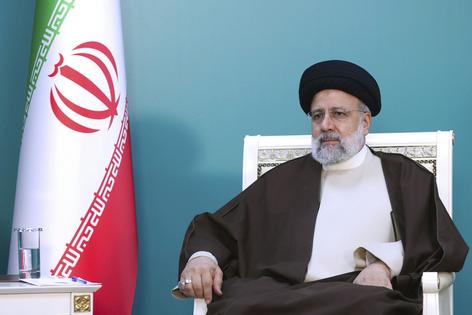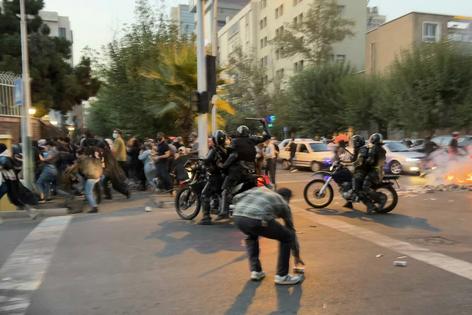Iran crash: President Raisi’s fate raises concerns in Tehran over potential loss of loyalist
Published in Political News
Iranian President Ebrahim Raisi, who remains missing after the helicopter he was in crashed on May 19, 2024, is a consummate loyalist whose death would be a blow to the country’s conservative leadership.
While search and rescue teams – hampered by rain, fog, forests and mountains – searched for wreckage, Iran’s Supreme Leader Ayatollah Ali Khamenei said the nation “should pray” for Raisi’s health.
As an expert on Iran’s domestic politics and foreign policy, I believe concern in Tehran may extend beyond the potential human tragedy of the crash. If Raisi were to die, it would have important implications for an Iranian state that is consumed by domestic chaos, and regional and international confrontation.
Since the Iranian Revolution of 1979, Raisi has acted as an assiduous apparatchik of the Islamic Republic and a prominent protégé of Khamenei, who as supreme leader holds ultimate power in the Islamic Republic.
Before becoming president in 2021, Raisi held various positions inside the judiciary under the purview of the supreme leader. As a prosecutor, and at the end of the Iran-Iraq War in 1988, he sat on the committee that sentenced thousands of political prisoners to death.
The executions earned him the nickname the “Butcher of Tehran” and subsequently subjected him to sanctions by the United States and to condemnation by the United Nations and international human rights organizations.
Since 2006, Raisi has served on the Assembly of Experts, a body that appoints and supervises the supreme leader.
And despite being seen as lacking charisma and eloquence, it was thought that Raisi, 63, was being groomed to succeed the 85-year-old Khamenei as supreme leader.
Domestically, Raisi’s presidency has been both the cause and consequence of a legitimacy crisis and societal chaos for the regime.
He controversially won the 2021 presidential election after a high number of candidate disqualifications by the Guardian Council, which vets candidates, and a historically low voter turnout of less than 50%.
To appease his conservative base, Raisi and his government have reinvigorated the morality police and reimposed religious restrictions on society. This policy led to the Women, Life, Freedom protests sparked by the death in police custody of Mahsa Amini in 2022. The demonstrations proved to be the largest and longest in the Islamic Republic’s near 50-year history. They also resulted in unprecedented state repression, with over 500 protesters killed and hundreds more injured, disappeared and detained. Throughout the protests, Raisi demonstrated his loyalty to the leader and conservative elites by doubling down on restrictions and crackdowns.
Meanwhile, under Raisi, Iran’s economy has continued to suffer due to a combination of government mismanagement and corruption, along with U.S. sanctions that have intensified in response to Tehran’s domestic repression and overseas provocations.
Domestic turmoil under Raisi’s presidency has been accompanied by shifts in Iran’s regional and international role.
As supreme leader, Khamenei has the final say on foreign policy. But Raisi presided over a state that has continued down the path of confrontation toward its adversaries, notably the U.S. and Israel.
And whether out of choice or perceived necessity, Tehran has moved further away from any idea of rapprochement with the West.
Faced with increased U.S. sanctions, Iran under Raisi has been reluctant to revive the nuclear deal.
Instead, Iran has increased uranium enrichment, blocked international inspectors, and become a nuclear threshold state.
Raisi also continued the “Look to the East” policy of his predecessor, Hassan Rouhani. To this end, he and his government have pursued greater rapprochement with China.
Beijing, in turn, has offered an economic lifeline by importing Iranian oil and brokering a diplomatic agreement between Iran and Saudi Arabia in March 2023.
Meanwhile, under Raisi’s presidency, Iran has continued to serve as an ally and funder of anti-US and anti-West conflicts, delivering combat drones to Russia for use in Ukraine and providing arms to various regional proxies in the Middle East.
Since the war in Gaza began on Oct. 7, 2023, Iran under Khamenei and Raisi has maintained a delicate balance between enabling its regional proxies to counter Israel and the United States while avoiding a direct confrontation with both countries, who are conventionally superior foes.
This balance was momentarily disrupted when the Islamic Republic directly attacked Israel with drones and missiles for the first time in history in April in retaliation for a strike on Iran’s consulate in Damascus.
Raisi – although not directly responsible for foreign policy – has been a key supporter of the Iranian regime as it has sought to further distance itself from the established international order and seek alliances with countries similarly antagonistic toward the West.
At the time of the helicopter crash, Raisi and his colleagues were returning from a dam inauguration ceremony held in neighboring Azerbaijan. The ceremony was presumably intended for Iran to ingratiate itself with Azerbaijan, having earlier taken an ambiguous, if not adversarial, position in the Nagorno-Karabakh conflict – which ended in a convincing Azerbaijani victory in late 2023.
Should that crash be found to have been fatal for Raisi, the death would be a setback for the Islamic Republic; Supreme Leader Khamenei would have lost a longtime loyalist, regime insider and a prospective successor.
Under the Iranian constitution, any death of a president would result in the first vice president serving as interim president. In that case, that would mean Mohammad Mokhber, who is a politician much in the same making of Raisi, and who has been a prominent member of the Iran team negotiating weapons deals with Moscow.
Iran would also have to hold presidential elections within 50 days. It remains to be seen who, in that instance, the supreme leader would give the nod to as a future president and potential successor.
But it is all but certain that conservatives in Tehran will continue to circle the wagons, given the internal and external pressure they face.
Domestically, this could take the form of greater state repression and election manipulation. Regionally and internationally, I believe it could mean forging stronger ties with budding allies and pursuing calculated confrontation against traditional adversaries.
This article is republished from The Conversation, a nonprofit, independent news organization bringing you facts and analysis to help you make sense of our complex world.
Read more:
Why has an Israel-Hamas ceasefire been so elusive? A timeline of key moments in the search for peace
A different way to address student encampments
Eric Lob is affiliated with the Middle East Institute.
































































Comments